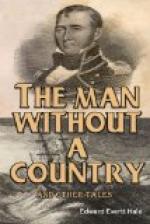“I thank you for the suggestion. I knew the unforgetting professor; and I do not doubt that he remembered David and Homer as his near friends. But, of course, to such a memory, a century or two might easily slip aside.
“Now, did you look up Clement? And did you not forget the Arundelian Marbles? For, if you will take the long estimates, you will find that some folks think Homer lived as long ago as the year 1150, and some that it was as ‘short ago’ as 850. And some set David as long ago as 1170, and some bring him down to a hundred and fifty years later. These are the long measures and the short measures. So the long and short of it is, that you can keep the two poets 320 years apart, while I have rather more than a century which I can select any night of, for a bivouac scene, in which to bring them together. Believe me, my dear Miss D., always yours, &c.
“Confess that you forgot the Arundelian Marbles!”
THE SOUTH AMERICAN EDITOR
[I am tempted to include this little burlesque in this collection simply in memory of the Boston Miscellany, the magazine in which it was published, which won for itself a brilliant reputation in its short career. There was not a large staff of writers for the Miscellany, but many of the names then unknown have since won distinction. To quote them in the accidental order in which I find them in the table of contents, where they are arranged by the alphabetical order of the several papers, the Miscellany contributors were Edward Everett, George Lunt, Nathan Hale, Jr., Nathaniel Hawthorne, N.P. Willis, W.W. Story, J.R. Lowell, C.N. Emerson, Alexander H. Everett, Sarah P. Hale, W.A. Jones, Cornelius Matthews, Mrs. Kirkland, J.W. Ingraham, H.T. Tuckerman, Evart A. Duyckinck, Francis A. Durivage, Mrs. J. Webb, Charles F. Powell, Charles W. Storey, Lucretia P. Hale, Charles F. Briggs, William E. Channing, Charles Lanman, G.H. Hastings, and Elizabeth B. Barrett, now Mrs. Browning, some of whose earliest poems were published in this magazine. These are all the contributors whose names appear, excepting the writers of a few verses. They furnished nine tenths of the contents of the magazine. The two Everetts, Powell, William Story, and my brother, who was the editor, were the principal contributors. And I am tempted to say that I think they all put some of their best work upon this magazine.




